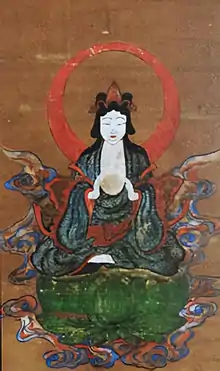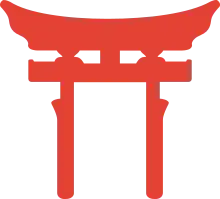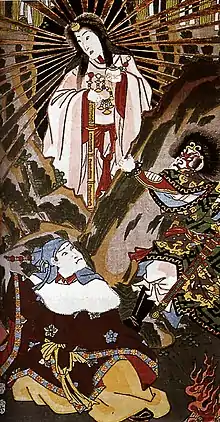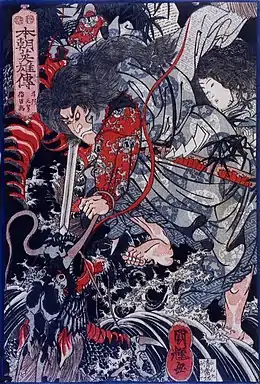Tsukuyomi-no-Mikoto
Tsukuyomi-no-Mikoto (ツクヨミノミコト, 月読命),[1] or simply Tsukuyomi (ツクヨミ, 月読) or Tsukiyomi (ツキヨミ),[2] is the moon god in Japanese mythology and the Shinto religion. The name "Tsukuyomi" is a compound of the Old Japanese words tsuku (月, "moon, month", becoming modern Japanese tsuki) and yomi (読み, "reading, counting").[3] The Nihon Shoki mentions this name spelled as Tsukuyumi (月弓, "moon bow"), but this yumi is likely a variation in pronunciation of yomi.[3] An alternative interpretation is that his name is a combination of tsukiyo (月夜, "moonlit night") and mi (見, "looking, watching").
| Tsukuyomi-no-Mikoto | |
|---|---|
God of the moon | |
 Rare artwork of Tsukuyomi-no-Mikoto | |
| Other names | Tsukuyomi (ツクヨミ, 月読), Tsukiyomi (ツキヨミ), 月読尊、月弓尊、月夜見尊、月讀尊 |
| Planet | Moon |
| Region | Japan |
| Personal information | |
| Parents | Izanagi (Kojiki) Izanagi and Izanami (Nihon Shoki) |
| Siblings | Amaterasu, Susanoo |
| Part of a series on |
| Shinto |
|---|
 |
| Practices and beliefs |
| Shinto shrines |
| Notable Kami |
| Important literature |
|
| See also |
There is so little known about Tsukuyomi that even their sex is unknown. However, in Man'yōshū, where Tsukuyomi's name is sometimes rendered as Tsukuyomi Otoko (月讀壮士, "moon reading man").[4]
Tsukuyomi was the second of the "three noble children" (三貴子, Mihashira-no-Uzu-no-Miko) born when Izanagi-no-Mikoto, the god who created the first land of Onogoroshima, was cleansing himself of his sins while bathing after escaping the underworld and the clutches of his enraged dead wife, Izanami-no-Mikoto. Tsukuyomi was born when he washed out of Izanagi's right eye.[5] However, in an alternative story, Tsukuyomi was born from a mirror made of white copper in Izanagi's right hand.
Tsukuyomi angered Amaterasu when he killed Ukemochi, the goddess of food. Amaterasu once sent Tsukuyomi to represent her at a feast presented by Ukemochi. The goddess created the food by turning to the ocean and spitting out a fish, then facing a forest and spitting out game, and finally turning to a rice paddy and coughing up a bowl of rice. Tsukuyomi was utterly disgusted by the fact that, although it looked exquisite, the meal was made in a disgusting manner, and so he killed her.[5]
Soon, Amaterasu learned what happened and she was so angry that she refused to ever look at Tsukuyomi again, forever moving to another part of the sky. This is the reason that day and night are never together. However, some say it was Susanoo who killed Ukemochi.[6]
Gallery
_02.JPG.webp) The Betsugu Tsukiyomi-no-miya Sanctuary of Kotaijingu (Naiku) at Ise city
The Betsugu Tsukiyomi-no-miya Sanctuary of Kotaijingu (Naiku) at Ise city A shrine to Tsukuyomi-no-Mikoto at Matsunoo-taisha in Kyoto
A shrine to Tsukuyomi-no-Mikoto at Matsunoo-taisha in Kyoto The descent to earth of Mahoraba, grandson of the Shinto moon god Tsukuyomi-no-Mikoto (壱岐 一支国 月讀尊 まほらば大地降臨図?)
The descent to earth of Mahoraba, grandson of the Shinto moon god Tsukuyomi-no-Mikoto (壱岐 一支国 月讀尊 まほらば大地降臨図?)
See also
References
- 平藤喜久子 (2013-02). "スサノオ 建速須佐之男命(記)、素戔嗚尊(紀)". In 松村一男ほか編 (ed.). 神の文化史事典. 白水社. p. 285. ISBN 978-4-560-08265-2. Check date values in:
|date=(help) - "ツキヨミノミコト(月読尊)". ブリタニカ国際大百科事典 小項目事典. コトバンク. Retrieved 2016-09-18.
- 1988, 国語大辞典(新装版) (Kokugo Dai Jiten, Revised Edition) (in Japanese), Tōkyō: Shogakukan
- c. 759: Man'yōshū, volume 7, poem 1372; in Old Japanese. Text available online here.
- Roberts, Jeremy (2010). Japanese Mythology A To Z (PDF) (2nd ed.). New York: Chelsea House Publishers. ISBN 978-1-60413-435-3.
- 『日本神話事典』211頁。
External links
 Media related to Tsukuyomi-no-Mikoto at Wikimedia Commons
Media related to Tsukuyomi-no-Mikoto at Wikimedia Commons- Tsukiyomi on the Japanese History Database.

